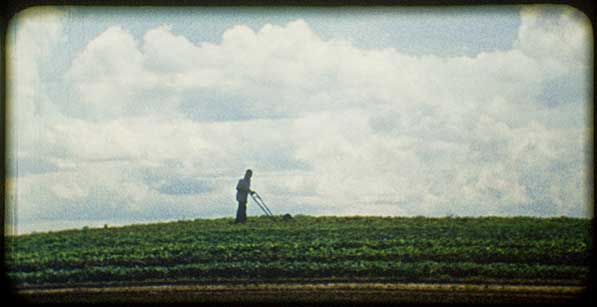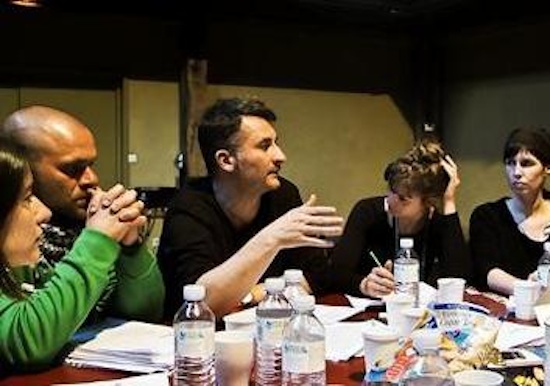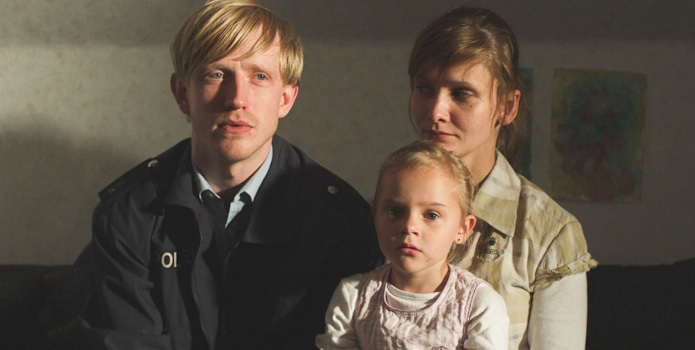With the recent expansion of the Wavelengths Program, the Toronto International Film Festival has been able to accommodate more films, particularly work that falls somewhere between short and feature-length designation. Allotted a block of time equal to that of your traditional screening, these films of intermediate duration are given a showcase via programs featuring multiple works. Amongst these ranks, the highlights of this year’s festival were French iconoclast Jean Marie-Straub’s latest cinematic monologue, Un Conte de Michel de Montaigne, wherein the sixteenth century author’s text is recited atop images of his marbled visage, Nathaniel Dorsky’s wisely paired diptych of compartmentalized phosphorescence, Song and Spring, Peter Hutton’s meditation on the routine pleasures of far-flung laborers, Three Landscapes, and, most especially, Miguel Gomes’ nostalgic montage of personal and cultural debility, Redemption, something of a mini masterpiece in and of itself. Alongside these works were less immediate experiments such as Mati Diop’s earnest but fleeting hybrid narrative A Thousand Suns and the dense archival mediation on Mussolini’s savage conquest of Africa, Pays Barbare, by Yervant Gianikian and Angela Ricci Lucch, the little known duo behind the late-eighties landmark From the Pole to the Equator.
The program’s most noteworthy achievements, however, came from the features line-up, with two films in particular towering over the selection. Unapologetically challenging, both Catalan director Albert Serra’s Story of My Death and Taiwanese master Tsai Ming-liang’s rumored swan song, Stray Dogs, betray unparalleled formal rigor, taken to extreme ends unique even amongst most contemporary cinema. The former, a deliciously ribald conflation of the Casanova and Dracula legends and a subversion of the staid period drama, is the fullest flowering of Serra’s talents to date, another in a line of devious literary interpolations, and a work of both base and cerebral pleasures—Serra is now, quite literally, our foremost vulgar auteur. The latter, meanwhile, feels like a recalibration of Tsai’s predominant aesthetic and thematic tools after the reconciliatory discomforts of Face (2009). Focusing on a sub-lower class family eking out an existence against the cold capitalist Taipei cityscape, Stray Dogs epitomizes Tsai’s sociological concern, imbuing the narrative with uncommon humanity without sacrificing his unforgiving structuralist control. Potentially representing both an arrival and a departure, Story of My Death and Stray Dogs seem destined to be considered amongst the year’s most substantial new works.
While not as inherently dynamic, many of the program’s other highlights made an asset out of their conceptual roots. It’s right there in the title of Three Interpretation Exercises, the latest from Romanian New Wave figurehead Cristi Puiu, who workshops Vladimir Solovyov’s Three Conversations and A Short Story about the Antichrist with a dozen actors across three episodes in a simultaneous examination of acting improvisation and a stylistic tribute to Eric Rohmer. Less philosophical yet similarly rigorous in construction is Stephanie Spray and Pacho Velez’s Manakamana, the latest missive from Harvard’s Sensory Ethnographic Laboratory (the same organization that produced festival sensations Sweetgrass and Leviathan). Observing a simple series of uninterrupted trolley rides across a vast Nepalese valley, the film dissects a cloistered interior space while turning its passengers into documents of cultural minutiae. Said topicality is finally transformed into cinematic auto-critique in Raya Martin and Mark Peranson’s La Última Película, an appropriately teamed collaboration between the Filipino filmmaker and the Canadian film critic. Utilizing as a kind of source text Dennis Hooper’s fabled 1971 disasterpiece The Last Movie, Martin and Peranson spin a narrative about a young filmmaker drunk on his own talent into a portrait of tyrannical artistry and an analyzation of the aesthetic apparatus.
A more realist approach, both literally and formally, shades both Wang Bing’s newest long-form document of Chinese social and political ills, ‘Til Madness Do Us Part, and Ben Rivers and and Ben Russell’s three-part fusion of ethnic, communal, and musical rituals, A Spell to Ward Off the Darkness. Wang’s four-hour opus observes the daily lives of a block of patients in an unnamed Seoul mental institution, methodically documenting the fading existences of a diverse group of men (some criminally insane; others simply challenged) with no hope for rehabilitation in the face of government neglect. Meanwhile, the highly promising collaborative effort between Rivers and Russell, two of the great avant-garde filmmakers of their generation, follows a mysterious drifter from a soul-searching stay in an Estonian commune through a spiritual trip through the Finnish wilderness to, finally, a self-administered mental exorcism as he performs as part of a black metal quartet in one of the most sustained sequences of visceral intensity you’re likely to have in a cinema. By definition, this kind of precarious experimentation doesn’t always succeed. Indeed, both Philip Gröning’s maddeningly structured, fifty-nine-part saga of domestic violence, The Police Officer’s Wife, and Caroline Strubbe’s equally laborious tale of unlikely accomplices, I’m the Same I’m An Other, offer little satisfaction to such demanding narrative expectations. And yet therein lies the beauty of exercising such faith: Without those artists brave enough to take us forward, we’d be destined to stand still.







